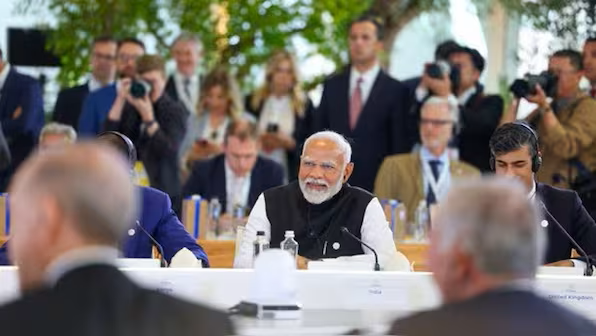G7+1: How India bridges between West and Global South amid fractured world order
- August 7, 2024
- Posted by: Anil Trigunayat
- Category: India

India’s upward trajectory and quest to be a ‘rule-maker and shaper’ make it well placed to craft and promote its principled foreign policy while reiterating that ’this is not an era of war’ and dialogue and diplomacy can only lead to peace
The G7 Summit, hosted by Prime Minister of Italy Georgia Meloni in the historic and beautiful Apulia region from June 13–15, has come at a time when the world is facing multiple consequential changes and challenges.
The two ongoing wars in Europe and the Middle East confront them where their own roles have been questioned. The liberal order is under tremendous stress, for which its originators and founders are equally responsible for its near demise. Undermining the multilateralist regimes and institutions, they resorted to unilateral measures, arbitrary sanctions, and prescriptive mandates, which they did not follow themselves. The seeds of a new alternative were, to a great extent, sown by them.
The G7 itself was founded in 1975, when the ‘Oil Crisis ‘and embargo by the Arabs, in the wake of the 1973 war and US role therein, had stretched the major economies to the hilt. Five decades on, this 50th meeting has faced similar challenges, which have been farmed out by the Covid-19 pandemic, the Russia-Ukraine war, and the Israel-Hamas war.
Hence, the duo is also propagating their own brand of the world order while harking back to the primacy of multilateral institutions, especially the United Nations, which is already on ventilator, while greater emphasis on the BRICS, Shanghai Cooperation Organisation, and Eurasian landscape is a reality.
At the present time, the G7 is preoccupied by the Russian invasion of Ukraine and how to defeat Putin through an indirect war by projecting themselves as the saviours of the faltering international rules-based order.
Provision of more advanced weapon systems to the Chief Guest of the event, Comrade Zelensky, and agreeing to provide $50 billion of the Russian funds in Western banks for reconstruction of war-ravaged eastern Ukraine will only fire the resolve of re-elected President Putin to be even more vengeful. The situation cannot change as long as the West continues to support the fight until the last Ukrainian, as correctly conveyed by the slip of the tongue of President Biden.
The G7 has emerged as a pole in the very likely scenario of a geopolitically divided Cold War 2.0. No doubt, in the geoeconomic sense, the new order will have several centres of economic power. There is no doubt that the pivot has moved to East and South, in which India will play a stronger role not only as a second or third largest economy but also as a bridge builder between East and West and North and South and as a credible “Voice of the Global South” through its principled foreign policy and strategic autonomy, adding to its comprehensive power with the ‘India First’ approach for the greater good and welfare of the world. It might have its own limitations with the fractious transitional order but has the moral capacity to be a beacon of hope.
India has virtually become an integral part of G7+1, as it has already been invited 11 times. Prime Minister Modi himself has attended and contributed a great deal to the five outreach summits with his novel ideas on the key global challenges. His visit to Italy happens to be the first one after the beginning of the Modi 3.0 era. Bilateral relations with Italy under PM Meloni and PM Modi have really moved beyond the ‘Sonia factor’ that had dogged the partnership for quite some time.
Today, both countries are working in a strong strategic partnership, not only in the bilateral domain but also in regional and global formats. The India-Middle East-Europe Economic Corridor (IMEC), even if currently under stress due to the Israel-Hamas war, has provided convergence for Rome and the Raisina Hills.
Again, Africa, the Mediterranean, and the Indo-Pacific provide a strategic landscape for cooperation. Artificial intelligence (AI), data regulation, climate change, and critical technologies are key challenges where their use for the benefit of humankind has to be promoted through international collaboration, and abuse by non-state actors and extremist terror groups must be contained and prevented. For these reasons, global solidarity is warranted, but it does not appear to be on the horizon given the state of flux and churn in the vertically opposed positions of the major powers. Could India play a bridging role? That is the moot question!
India has displayed its diplomatic prowess, universal welfare, and concern during its 2023 presidency of the G20, which projected the intent and sincerity to take everyone along for the global good. In the Group of G7+1, India has already surpassed four major economies in terms of GDP. Its upward trajectory and quest to be a ‘rule-maker and shaper’ make it well placed to craft and promote its principled foreign policy while reiterating to the Russians and others that “this is not an era of war” and that dialogue and diplomacy can only lead to peace. PM Modi, during his bilaterals with key leaders, including Zelensky, conveyed the crux of the Indian approach to global peace and solidarity as the Global South and its core concerns and interests remain India’s priority.
The writer is a former Indian Ambassador to Jordan, Libya and Malta and is a Distinguished Fellow with leading think tank Vivekananda International Foundation. Views expressed in the above piece are personal and solely those of the author. They do not necessarily reflect Firstpost’s views.
